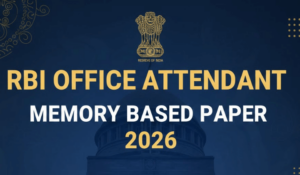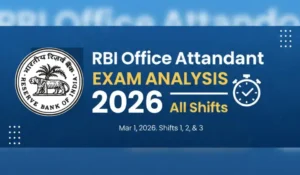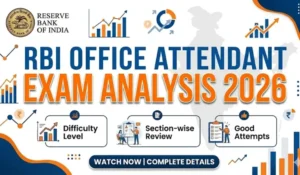IBPS places strong emphasis on conducting exams where every candidate competes on equal terms. Since all questions must be answered independently, the organisation carefully monitors situations that may indicate unfair practices. This includes checking for disturbances at the centre, irregularities in identification, or any behaviour that goes against exam rules.
How IBPS Detects Irregular Scores
IBPS uses detailed analytical systems to study how candidates answer questions. If anything unusual appears in the scoring pattern, the case is reviewed more closely.
- IBPS uses special systems to study candidate responses and scores.
- If the score appears unusual or not genuine, IBPS can cancel it.
- Observations from invigilators and reports from candidates are also reviewed.
- Any irregularity in test administration or behaviour inside the hall is considered.
Normated Standards for Flagged Cases of Non-Genuine Scores: Notice
Why IBPS Checks for Non-Genuine Scores
IBPS wants to ensure that every candidate attempts the exam honestly and without help from others. These checks help maintain fairness so that genuine candidates are not harmed.
- IBPS wants every candidate to answer the exam independently and fairly.
- Any disturbance, identity issue, or misconduct during the exam is taken seriously.
- These checks help protect honest candidates who follow the rules.
- The aim is to keep the exam process trustworthy and mistake-free.
Checking Answer Patterns in Objective and Descriptive Papers
IBPS carefully compares each candidate’s answers with others to find unusual similarities. This helps detect copying, collaboration, or repeated patterns that are unlikely to occur naturally.
- IBPS compares each candidate’s answers with others to spot unusual similarity.
- If many candidates have the same pattern of right and wrong answers, it becomes suspicious.
- For descriptive papers, IBPS checks for copied content, repeated phrases, or unnecessary fillers.
- These checks help detect collaboration, copying, or attempts to trick the system.
Reviewing Identification and Past Records
IBPS also looks at identification details, application data, and previous exam records to check for inconsistencies. Any mismatch or unusual answering behaviour can lead to further investigation.
- IBPS verifies identification details recorded during the exam session.
- Application information and previous exam records of the candidate are examined.
- If the method of answering seems abnormal or inconsistent, the system flags it.
- All these layers of checking help identify whether the score was earned fairly.
Information Shared with Candidates
IBPS clearly informs candidates that their responses will be analysed to detect similarities. This ensures that everyone is aware of the rules and possible actions before appearing for the exam.
- IBPS mentions in the admit card and exam booklet that answer patterns will be analysed.
- Candidates are warned that suspicious scores may be cancelled without prior notice.
- Even after results are released, IBPS can cancel a score if new information appears.
- Recruiters are informed if such cancellations happen later.
Role of the Committee for Detection of Unfair Means
Every flagged case is reviewed by an expert committee to ensure decisions are fair. The committee studies all evidence before recommending the cancellation of candidature.
- Every flagged case is reviewed by a special committee before final action.
- The committee studies all evidence, reports, and answer patterns.
- If the committee confirms that the score is not genuine, it recommends disqualification.
- These methods follow global testing standards and have been supported by Indian courts.
Purpose of These Checks
The entire system is designed to protect sincere candidates and maintain trust in the recruitment process. IBPS ensures that only those who genuinely progress further.
- The main goal is to protect genuine candidates from unfair competition.
- IBPS ensures that only deserving candidates move ahead in the recruitment process.
- Strict monitoring helps keep the exam fair, transparent, and reliable.
- These measures maintain the overall integrity of IBPS examinations.





 RBI Office Attendant Memory Based Paper ...
RBI Office Attendant Memory Based Paper ...
 RBI Office Attendant Exam Analysis 2026,...
RBI Office Attendant Exam Analysis 2026,...
 RBI Office Attendant Exam Analysis 2026,...
RBI Office Attendant Exam Analysis 2026,...








